
10 ways to help students become “future ready”
This makes an excellent refection activity to see if you are helping students become future ready.

10 ways to help students become “future ready”
This makes an excellent refection activity to see if you are helping students become future ready.
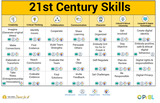
The following graphics contain:1. 21st Century Skills and their subskills2. 21st Century Skills, their subskills and connections to Factors Affecting Student Learning (FASA)
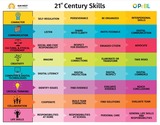
In today's world, 21st century skills are crucial for our learners as they provide the foundation for success in a rapidly evolving society. These skills, such as critical thinking, creativity, communication, collaboration, and digital literacy, equip children with the abilities to navigate complex challenges, adapt to change, and thrive in a globalized world. By nurturing these skills, we empower our learners to become agile, innovative, and socially responsible individuals who can actively contribute to the progress and well-being of our society.This resource has a 21st Century Skills poster, a big view 21st Century Skills Scope and Sequence document for grades 1-12, and a more focused view 21st Century Skills Scope and Sequence document for each of the following grade groupings 1-2, 3-6, 7-9, 10-12. This resource also has Digital Literacy Scope and Sequence documents for each of the following grade groupings 1-2, 3-6, 7-9, 10-12 (linked in each of the previous documents).

Students can self-assess their 21st century skills using the division rubrics. You may wish to have them write a short reflection in the box they evaluate themsevles in (supported, with some support, with limited support or independent), or they can simply mark where they feel they are as another option.At the bottom there is room for students to reflect on their greatest area of strength, and explain why. There is also an area for the student to indentify an area of growth and state how they can imporve. The documents are attached below in MSWord (feel free to edit to fit your needs) and PDF verisions. Teachers may include these reflections with student reports or conferences if they they choose to.

This is a fabulous list of 21 books to teach students about everything from self-regulation to patience.
These books would be a wonderful addition to any classroom library or library and would be excellent as read-aloud stories for students, followed by discussion.
These books are all connected to 21st century skills - especially self management or character/self-regulation.
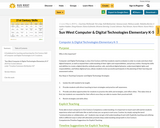
Sun West Computer & Digital Technologies K-5 Elementary Guidebook - please use the table of contents to navigate this guidebook. Also, we invite you to share resources you think would be suitable for this guidebook with any of the author's of this guidebook.
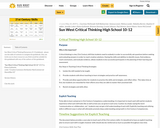
Sun West Critical Thinking 10-12 High School Guidebook - please use the table of contents to navigate the guidebook. Also, we invite you to share resources you think would be suitable for this guidebook with any of the authors of this guidebook.
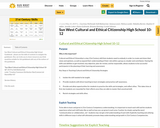
Sun West Cultural and Ethical Citizenship High School 10-12 Guidebook - please use the table of contents to navigate the guidebook. Also, we invite you to share resources you think would be suitable for this guidebook with any of the authors of this guidebook.
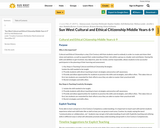
Sun West Cultural and Ethical Citizenship Middle Years 6-9 Guidebook - please use the table of contents to navigate the guidebook. Also, we invite you to share resources you think would be suitable for this guidebook with any of the authors of this guidebook.

For the past two years, Dinsmore Composite School has been developing a mentorship program for K-8 as part of the school timetable. The purpose of the program was to provide opportunities for older students to develop leadership skills and to foster collaboration, communication and problem-solving skills among all students. The planning and implementation process as well as an overview of the learning outcomes and activities will be highlighted. Participants will be invited to share their own experiences with mentorship in their schools and classrooms.

Ready-to-teach lessons to address your changing needs in the classroom.
"Help students take ownership of their digital lives.
Common Sense digital citizenship topics include media balance, cyber-bullying, news and media literacy, online privacy, digital footprint, and communication.
All students need digital citizenship skills to participate fully in their communities and make smart choices online and in life. Our award-winning K–12 Digital Citizenship Curriculum:
Addresses top concerns for schools.
Prepares students with critical 21st-century skills.
Supports educators with training and recognition.
Engages the whole community through family outreach."
Lessons are available in grade groupings for K-2, 3-5, 6-8 and 9-12.

Huge collection of graphics, videos, and links for supporting a growth mindset!
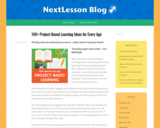
"I’ve listed 100+ PBL ideas below to help get you started on the project-based learning journey. The ideas below that are hyperlinked will send you to the project that is already developed. Those that are not yet hyperlinked are some of our ideas for future projects. I can’t wait to share them out when they are finished. In the meantime, use them to get inspired and give you some ideas to start PBL with your students."
Project ideas are organized by Education Level, and the High School ideas are further organized by subject.

Keyboarding Zoo is a fun and educational activity to help early elementary age students learn the keyboard. Children are encouraged to use their index or pointer fingers to match letters on the screen to their keyboards. Uppercase letters, numbers and symbols are coming soon!
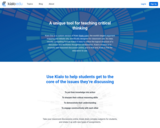
"Use Kialo to help students get to the core of the issues they’re discussing To put their knowledge into action.
To sharpen their critical reasoning skills
To demonstrate their understanding
To engage constructively with each other
Take your classroom discussions online, break down complex subjects for students, and shake it up with new types of assignments."
This education version is free for teachers to use!
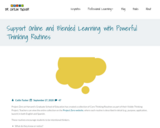
Project Zero at Harvard’s Graduate School of Education has created a collection of Core Thinking Routines as part of their Visible Thinking Project. Teachers can view the entire collection on the Project Zero website (https://pz.harvard.edu/thinking-routines#CoreThinkingRoutines), where each routine is described in detail (e.g., purpose, application, launch) in both English and Spanish.
These routines encourage students to be intentional thinkers.
What do they know or notice?
What is their perspective or position on an issue or idea?
How can they support their position or thinking?
What do they wonder? What are they confused about?
How has their thinking changed? What caused that change?
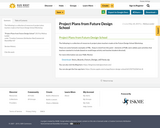
The following is a collection of resources & project plans teachers made at the Future Design School Workshop.
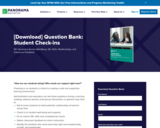
"How are our students doing? Who needs our support right now?"
This year, checking in on students frequently and consistently is even more critical to creating a safe and supportive learning environment.
Administrators and educators can these questions during a morning meeting, advisory period, small group intervention, or general class time to:
Check in on student well-being and supports
Do an interim SEL skills and competencies check
Gather classroom feedback to inform instruction
Identify the students who need extra help right now academically, socially, and emotionally
In This Guide, You'll Get Access to:
✔ Panorama's full check-ins question bank (includes 80+ free response and multiple choice questions for grades 3-12)
✔ Recommendations on who should use the questions, how often to send check-ins, and how to take action on the data
✔ An overview of Panorama's new student check-ins tool, which is a companion to annual SEL and school climate measurement "
You will need to provide your information to download the guide.

This is a cross curricular project revolving around the documentary The Social Dilemma. Students will write an essay and create an Action Plan to tackle the issues surrounding Social Media and it's pervasiveness in our lives. The outcomes covered are focused in Social 7, Health 7 and ELA 7.
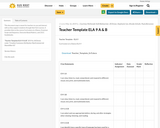
This document map is meant for teachers to use and interact with as they support students through their ELA courses. It provides links to the course Curriculum at a Glance, Grammar Scope and Sequence, Outcome Based Rubrics, and 21CC Guidebooks.